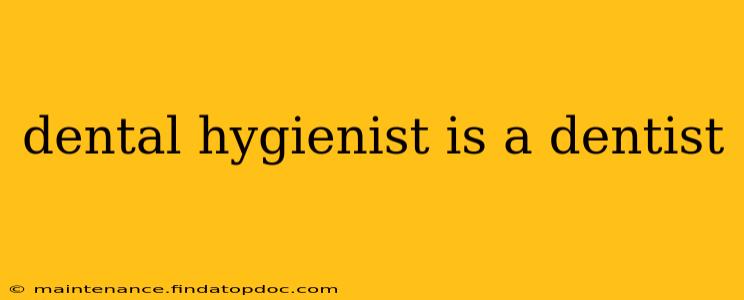Dental Hygienist vs. Dentist: Understanding the Key Differences
The question "Is a dental hygienist a dentist?" is a common one, and the answer is a simple no. While both dental hygienists and dentists work in the dental field and collaborate closely, their roles, training, and responsibilities are vastly different. Understanding these distinctions is crucial for anyone seeking dental care or considering a career in dentistry.
This article clarifies the differences between these two essential members of the dental team, answering frequently asked questions to provide a comprehensive understanding of their respective roles.
What does a dentist do?
Dentists are medical professionals who hold a Doctor of Dental Surgery (DDS) or Doctor of Dental Medicine (DMD) degree. Their extensive training equips them to diagnose, treat, and prevent oral diseases and conditions. This includes:
- Diagnosing and treating oral diseases: Dentists identify and treat cavities, gum disease, oral cancers, and other oral health problems.
- Performing surgical procedures: This can range from simple extractions to more complex procedures like implant placement.
- Restorative dentistry: Dentists restore damaged teeth through fillings, crowns, bridges, and dentures.
- Cosmetics dentistry: This area involves teeth whitening, veneers, and other procedures to improve the appearance of teeth.
- Orthodontics (in some cases): Some dentists specialize in straightening teeth.
What does a dental hygienist do?
Dental hygienists are licensed healthcare professionals who focus on preventative oral care. Their responsibilities include:
- Prophylaxis: This is the most common task, involving cleaning teeth, removing plaque and tartar, and polishing teeth to improve overall oral health.
- Oral health education: Hygienists educate patients on proper brushing and flossing techniques, diet, and other aspects of maintaining good oral hygiene.
- Applying sealants: These protect the chewing surfaces of teeth from decay.
- Taking X-rays: They take radiographs to assist the dentist in diagnosing and treating oral conditions.
- Identifying early signs of disease: Hygienists are trained to spot early signs of gum disease, cavities, and other oral problems and report them to the dentist.
What is the educational path for each profession?
The educational requirements for dentists and dental hygienists differ significantly:
-
Dentist: Requires a four-year undergraduate degree followed by four years of dental school, leading to a DDS or DMD degree. Many dentists then pursue further specialization through residencies.
-
Dental Hygienist: Typically requires an associate's or bachelor's degree in dental hygiene from an accredited program. This is followed by passing a licensing exam.
Do dental hygienists work under dentists?
Dental hygienists typically work under the supervision of a dentist. This means that while they perform many procedures independently, a dentist must oversee their work and make the final diagnoses. The dentist is ultimately responsible for the overall care of the patient.
Can a dental hygienist become a dentist?
Yes, a dental hygienist can become a dentist. However, they would need to complete the necessary prerequisites and apply to dental school, just like any other applicant. Their prior experience in the dental field might provide some advantages, but it does not exempt them from the rigorous dental school curriculum.
In conclusion, while both dental hygienists and dentists are vital to maintaining oral health, their roles, training, and responsibilities are distinct. Dental hygienists are focused on prevention and maintaining oral hygiene, working under the supervision of a dentist who diagnoses and treats oral health issues. Both professions are critical components of a comprehensive oral health care team.
